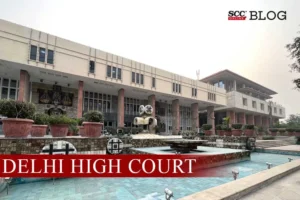Delhi High Court: A suit was filed by the plaintiffs being aggrieved by the use of the defendants, of the mark NILKRANTI and the logo. C. Hari Shankar, J., held that no case for interdicting the defendants from using the mark NILKRANTI as a word mark exists but the device mark is deceptively similar to the plaintiffs’ device mark.
Plaintiff 1 authorised Plaintiff 2 vide license agreement dated 01-09-1998 to manufacture, package, supply and render services of goods as mentioned in Schedule 1 of the license agreement. Plaintiff 2 is thus the licensee of Plaintiff 1 and is continuously using the trademark NILKAMAL. The plaintiffs are using the impugned marks for, among other things, plastic moulded chairs.
The Court noted that while the plaintiffs has made out prima facie for injunction against the defendants restraining them from using the device mark, however, no case has been made out for injuncting the defendants from using the word mark NILKRANTI. In case, the ground of ‘malafides’ be taken into account by the court while examining the aspect of deceptive similarity and infringement/passing off, the Court cannot grant an injunction merely on the premise that the defendants have acted malafide or with an intent to come close the plaintiff.
The Court further noted that the mark NILKRANTI, seen as a word mark cannot be regarded as confusingly similar to the mark NILKAMAL. The common prefix “NIL” is merely the first of three syllables that constitute the word. The plaintiffs do not have any registration for the “NIL” prefix of the NILKAMAL mark. Thus, the plaintiffs cannot claim a monopoly over the prefix “NIL” to injunct all others from using “NIL” as a prefix for the marks in respect of plastic moulded chairs or any other item or furniture for that matter.
Placing reliance on Cadila Health Care Ltd v. Cadila Pharmaceuticals Ltd, (2001) 5 SCC 73 wherein Pianotist test was emphasised in the following words
“You must take the two words. You must judge them, both by their look and by their sound. You must consider the goods to which they are to be applied. You must consider the nature and kind of customer who would be likely to buy those goods. In fact, you must consider all the surrounding circumstances and you must further consider what is likely to happen if each of those trade marks is used in a normal way as a trade mark for the goods of the respective owners of the marks”
Thus, applying the Pianotist test to the present case, it cannot be said that the marks NILKAMAL and NILKRANTI, seen as word marks, are so deceptively similar that a consumer of average intelligence and imperfect recollection is likely to confuse one for the other, or even to believe an association between the two within the meaning of Section 29(2)(b) of the Trade Marks Act. Thus, there is no similarity between NILKAMAL and NILKRANTI. In fact, the latter half of the two marks “KAMAL” and “KRANTI”, individually have their own distinct etymological connotations in vernacular, with one meaning a lotus and the other a revolution.
The Court observed that insofar as the rival device marks are concerned, the plaintiffs possess a registration for the device mark. When the device marks are compared as a whole, there is a stark similarity between the two. In each case, the word NILKAMAL and NILKRANTI are written in similar blue letters. The words “Nilkamal” and “Nilkranti” and both underlined. The “n figures” over the name NILKAMAL and NILKRANTI and are also similar to each other, though the central lotus and “H” figures may differ. In each case, the word has been encased in an elliptical border. A consumer of average intelligence and imperfect recollection who has come across the plaintiffs’ device mark affixed on a chair, at one point of time and, at a later point of time, comes across the defendants’ device mark, also affixed on a similar chair, has every likelihood of being confused between the two, or at least on believing that they are two marks belonging to the same person and are, therefore, associated.
Thus, the Court refused to restrain the defendants from using NILKRANTI as a word mark, either for chairs or for any other item, however, the Court restrained the defendants from using the device mark, or any other device mark which is confusingly or deceptively similar to the device marks used by the plaintiffs.
[Nilkamal Crates and Containers v Reena Rajpal, 2023 SCC OnLine Del 7129, decided on 06-11-2023]
Advocates who appeared in this case :
Ms. Anju Agrawal, Dr. Mohan Dewan, Mr. Rahul Maratha, Mr. D. Pawar, Mr. B. Ghosh, Mr. Vardhman Jain and Mr. M.K. Bhargava, Advocates for plaintiff
Mr. Satish Kumar, Mr. Sreejan Pankaj and Mr. Anil Kumar Sahu, Advocate for defendants

